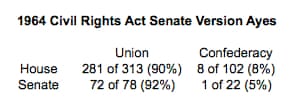Unkotare
Diamond Member
- Aug 16, 2011
- 129,821
- 24,907
- 2,180
Nor do Democrats put the Constitution and due process for citizens BEFORE partisan agenda. Timmy you won't find Democrats waving copies of the Declaration of Independence or the Constitution, but rainbow flags putting the beliefs of some people over the beliefs of others, while at the same time denouncing if Christians push their beliefs into public policy. It's only a constitutional violation if *Christians* do that, but LGBT can push THOSE relative beliefs on everyone else and penalize them for not complying. Because LIBERAL partisan beliefs are "more important" than Constitutional principles that protect everyone's beliefs equally. Conservative beliefs don't count, only liberal beliefs. To them the rainbow flag is a more important symbol than the US flag. Transgender bathroom policies should be worshipped and followed blindly, where anyone who questions security concerns for anatomical men using girls restrooms is attacked as a "bigot"; so LGBT creeds should come first over any other beliefs, and adopted by all people even while refusing to stand for the national anthem or to salute the flag " which should remain a free choice to reject." But not bathroom policies or free choice whether to believe and recognize gay marriage or not. only Liberals have the right to impose beliefs on the nation, but nobody else can or it violates "separation of church and state." Liberals are the exception because secular BELIEFS "don't count as imposing religion" so its legal for them and illegal for any other beliefs!
How do you think the ACA mandates got passed that deprive citizens of free choice? Only because Democrats in Congress voted for federal govt over personal free choice, and and a Democrat President endorsed it. Had a Republican President forced this bill, that requires citizens to pay to join Christian health ministries to be exempted from tax penalties, the liberals would have screamed for individual free choice. But as long as Democrats push partisan agenda, that trumps the Constitution and becomes the law of the land.
How many Constitutionalists are Democrats? I am one and can't find others. The other Democrats i know put party platform first before the Constitution. Why is that?
Why do you think they hate the ACLU , the greatest defender of our civil rights ?


Thanks for proving my point .
...
Yeah, and McDonalds is the greatest advocate against obesity.
Then you tell me. Who is the greatest advocates of our civil rights?
Nra has the 2nd covered . But what about the rest of our rights .
What is your nationality?




